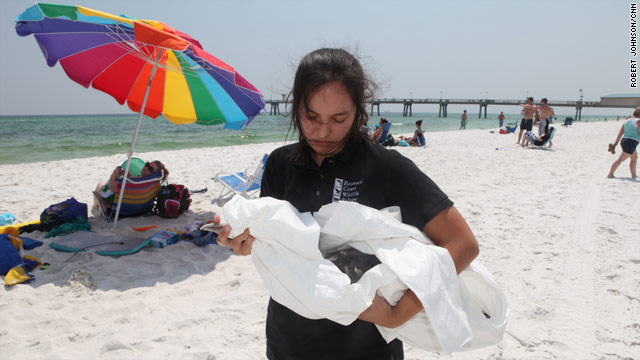
Stephanie Neumann holds a Northern Gannet
Okaloosa Island, Florida - Vacationers were the first to notice the bird fumbling in the water near this popular tourist beach last week. He bobbed and swayed differently than other birds, and didn't react when humans came dangerously close. Once he was ashore, they could see why: a light sheen of oil covered his feathers.
Animal health technician Stephanie Neumann tried to rescue the Northern Gannet, but beach safety officers stopped her. Her coworkers at the Emerald Coast Wildlife Refuge already had stabilized birds and a sea turtle affected by the Gulf oil disaster, but officials wanted to know: Did she have a contract with BP? Could she - and the bird - wait while they verified her organization's status?
"They're trying to do their job," Neumann said as she crouched over the motionless bird, wrapped in a white sheet and barely hidden from the stares of kids and parents. "They have to make sure protocol is followed."
When brown clumps of tar began to wash up on the snow-white beaches around Destin last week, the mood in this sunny beach community shifted from optimistic denial to furious worry. Local ideas about how to protect the area clashed with plans from BP, state and federal agencies. Community volunteers struggling to cut through protocol cheered a decision by Okaloosa County to defy BP and the feds. They were done waiting. They'd use their own plans.
"This is ridiculous. We'll take the heat. We would do whatever it took to stop the oil," said the county commission chairman, Wayne Harris.
After months of wrangling with agencies responding to the spill, Harris wasn't willing to stake the county's ecology and economy only on boom that captures or absorbs oil. The commission authorized emergency management teams to add skimmers, barges and extra boom, and an air wall they hope will push the oil away. They plan to layer prevention measures in the pass that connects the Gulf to Choctawhatchee Bay, where fresh and salt water mix and dolphins play. Harris said the plan could cost up to $6 million per month, which he hopes will be covered by money from BP.
The county developed its oil plan in the days after the disaster began to unfold, but it was plagued by miscommunications, disagreements and bureaucracy once it left local hands, Harris said.
Communities along the Gulf Coast have made similar complaints. Mayors grilled a BP official about the response during a press conference earlier this month. In Magnolia Springs, Alabama, locals went outside the federal plan and risked incarceration by adding boom and barges to protect Weeks Bay. In Pointe Aux Chenes, Louisiana, Native Americans pitched in to string boom near an island where many of their ancestors are buried.
Harris said some of his county's efforts may work; others may not. "Doing something is better than doing nothing," he said.
On the Okaloosa Island beach, local response to the oiled Gannet was quicker, but the federal response had less red tape to work through. U.S. Fish and Wildlife workers arrived before Neumann's status was verified, so she left their bird in their care.
"Time is essential with these guys," she said. "Every minute counts."
For the rest of Okaloosa County, more boom and barges were starting to appear in the water. The county commission vote was "smart," and sped up the state and federal response, said public safety director Dino Villani, who was quickly invited to an "olive branch" meeting in Mobile. Most of the county's preferred plans are moving forward, Villani said, and they'll continue to adapt as the oil moves throughout their waters.
Harris said the plans would have gone forward even without approval from BP or other government agencies.
"I'm sure they're cussing. I'm sure they're cussing us bad," Harris said. "If we had waited, we'd still be waiting. Why did it take us giving an ultimatum?"
Charles Diorio, a Coast Guard commander in Mobile, said some communities decided to implement their own plans once they saw they didn't top the list of state and federal priorities, if they were on the list at all. Some just wanted to act before the mess - and response agencies' attention - began to move their way.
Now that oil is reaching Florida's shores, resources are shifting there, Diorio said, and there's a plan to meet with Okaloosa commissioners this week.
"Now is the time to make sure these relationships are still working and strong and the lines of communication are open," he said.
Reader Comments
to our Newsletter